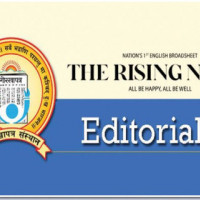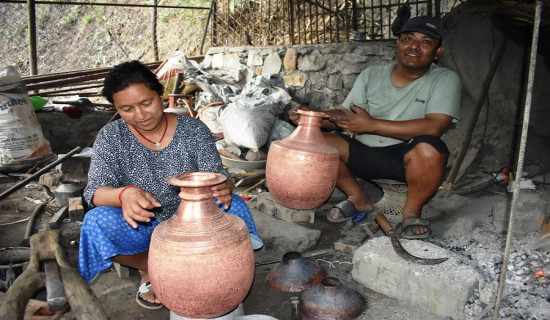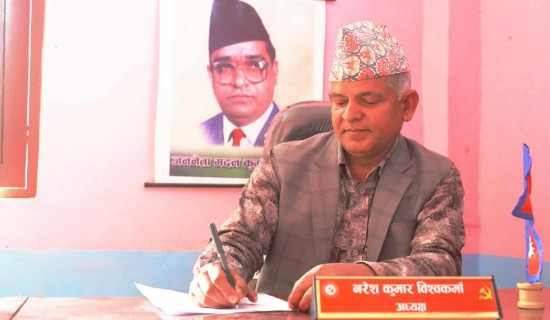- Tuesday, 13 May 2025
Nation Gets New President
The nation has got the new President. Senior Nepali Congress leader (NC) Ram Chandra Paudel has been elected the Head of State from the election held on Thursday. Securing 3,3802 vote weightage, Paudel, 78, emerged victorious defeating his rival CPN-UML’s vice-chair Subas Chandra Nembang, 70. Nembang received 1, 5518 vote weightage. The two experienced leaders had filed their candidacies for the high office. Both of them had played an important role in bringing about political changes in the country in 1990 and 2006. The Election Commission presented the certificate to Paudel on Thursday evening after the latter was declared the winner. The presidential poll was held at the Parliament Building, New Baneshwore, amidst a tight security and surveillance. The voting began at 10 am and concluded at 3 pm. Separate polling stations were arranged for the electorates in the Lhotse chamber of the Parliament Building. Paudel received the support from nine-party alliance that includes NC, CPN-Maoist Centre, CPN-Unified Socialist, Janata Samajwadi Party Nepal, Loktantrik Samajwadi Party Nepal, Janmat Party, Nagarik Unmukti Party, Rastriya Janamorcha and Nepal Samajwadi Party.
The Rastriya Swatantra Party (RSP) also voted for Paudel. Nembang had the support of UML alone. A total of 14 political parties are represented in the federal and provincial legislatures. Of them, the Rastriya Prajatantra Party (RPP) and Nepal Workers and Peasants Party abstained in the voting. As the term of office of incumbent President Bidya Devi Bhandari is expiring on Sunday (March 12), her successor Paudel is scheduled to assume his office on Monday after solemnisation of the oath. The President has a fixed tenure of five years from the date on which s/he is elected. As per the constitutional provision, the President is required to be sworn in by the Chief Justice of the Supreme Court (SC). Acting Chief Justice Hari Krishna Karki will administer the oath of office and secrecy to Paudel. The two presidential candidates have worked as Speaker of the House of Representatives before Nepal became a federal republic. Nembang also served as the Chairman of the Constituent Assembly that drafted the Constitution of Nepal, 2015.
The constitution stipulates that no person shall be elected to the Office of President more than two tenures. Incumbent President Bhandari served the office for two consecutive terms. The national charter has made an arrangement for an Electoral College that comprises of members of the House of Representatives, the National Assembly and the Provincial Assemblies. The voting weightage of each of the members of the Federal Parliament is 79 while it is 48 for a member of the Provincial Assembly. According to the constitutional provision, a person securing a majority of the existing total votes of the Electoral College is elected as the President. Born into a middle-class family at Bahunpokhara of Tanahun district, Paudel holds Master’s degree in Nepali literature. He was elected to the House of Representatives from Tanahun-1 from the elections held in November 2022.
The President is the ceremonial Head of the State who is entrusted with the responsibilities of abiding by the constitution and protecting it. Besides, the President also contributes to promoting national harmony and national unity. While exercising the powers and duties, the President performs all other functions to be performed by him or her on the recommendation and with the consent of the Council of Ministers. After having elected the President, Paudel said that he will remain dedicated to institutionalising the constitution.

















